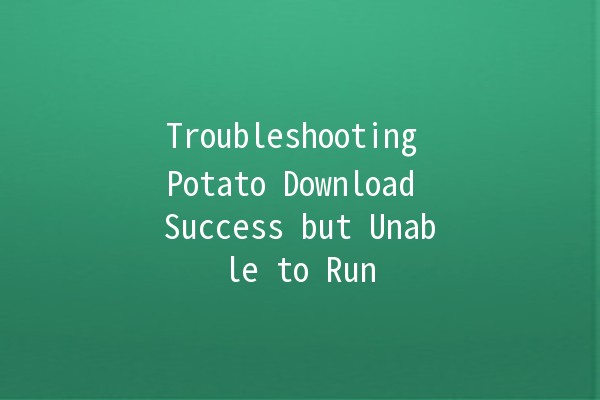In today’s digital world, encountering issues with software downloads can be frustrating. If you've successfully downloaded Potato but find yourself unable to run it, don’t worry! This article will guide you through actionable tips to troubleshoot and resolve the problem. 🛠️
Understanding the Problem
When you download an application like Potato, it may happen that the installation seems successful, but when you attempt to launch the program, nothing happens. There can be various reasons for this issue, including compatibility problems, missing dependencies, or corrupted files. Below we explore practical tips to enhance your productivity while troubleshooting this problem.
Before diving into potential fixes, ensure that your device meets the system requirements for running Potato. Compatibility issues often arise from using outdated hardware or operating systems.
Action Steps:
Research System Requirements: Look up the official Potato specifications online, usually found on their website.

Compare with Your System: Check your computer's specifications, such as RAM, CPU, and operating system version.
Consider Updating: If your system falls short, consider upgrading your hardware or OS for better performance.
Example:
If Potato requires Windows 10 but your system is running Windows 8.1, it’s time to consider an upgrade. This will not only help with Potato but improves overall system performance.
Sometimes, permission issues can prevent an application from running correctly. Running Potato as an administrator can often resolve this.
Action Steps:
Rightclick the Potato Shortcut: Choose “Run as administrator” from the context menu.
Check for Prompts: If prompted by the User Account Control (UAC), click “Yes” to allow it to run.
Example:
By running Potato as an administrator, the software may access necessary files or system resources that it otherwise couldn't.
If the software was not installed properly, it might not work as intended. Corrupted installations can lead to functionality issues.
Action Steps:
Uninstall Potato: Navigate to your control panel and uninstall the software completely.
Delete Remaining Files: After uninstallation, check program files to remove any leftover files.
Reinstall the Software: Download the latest version from the trusted source and install it fresh.
Example:
If your previous download was interrupted, downloaded files may have been corrupted. A clean installation usually resolves functionality concerns.
Outdated drivers can cause software to underperform or not run at all. Keeping your graphics and other system drivers updated can resolve these issues.
Action Steps:
Identify Required Drivers: Check which drivers are relevant for Potato—graphics, audio, etc.
Update Drivers: Use device manager or manufacturer’s website for updates.
Example:
Outdated graphics drivers can cause Potato to fail to exploit graphical capabilities. Updating to the latest version may solve startup issues effectively.
Antivirus software or firewalls may block Potato from launching, mistakenly identifying it as a threat. This can be common if the app is not recognized.
Action Steps:
Access Antivirus Settings: Open your antivirus software and look for notifications regarding blocked components.
Add Exception: Create an exception for Potato within the antivirus or firewall settings.
Example:
If your antivirus software blocks Potato during startup, adding it to exceptions can allow it to run smoothly.
Certain applications require specific components to function correctly. Missing frameworks or other software can lead to execution issues.
Action Steps:
Identify Dependencies: Research any SDKs, APIs, or frameworks that Potato might require.
Install Missing Components: Download and install necessary dependencies, such as the .NET Framework or Visual C++ Redistributables.
Example:
If Potato relies on Microsoft .NET Framework and it’s not installed, the application will fail to launch. Installing this framework usually resolves this issue.
Common Issues and Their Solutions
Here are some frequent concerns users report and how to tackle them.
Q1: What if Potato closes unexpectedly after launching?
This often hints at a compatibility issue or conflict with other software. To troubleshoot:
Check for conflicting applications.
Ensure all software is updated.
Adjust settings to reduce resource use.
Q2: Why can’t I find the Potato installation files?
If you're struggling to locate installation files:
Check the download folder or set a dedicated location for downloads in your browser settings.
Use the search function on your computer to locate 'Potato.'
Q3: Is it possible that my computer is too slow for Potato?
A slow computer can hinder application performance. Solutions include:
Close background applications to free up resources.
Upgrade hardware where feasible.
Q4: Can I run Potato on a Mac or Linux?
If you’re on a Mac or Linux system, make sure you check if Potato has crossplatform compatibility. Alternatively, consider using a virtual machine to run Windows applications.
Q5: What should I do if I’m still having trouble?
If the above solutions don’t resolve your issues:
Visit online forums for community help.
Contact Potato support with specific error messages for tailored advice.
Q6: Will reinstalling Potato remove my saved data?
Most installations should maintain user data unless you specifically delete it during the uninstallation process. Always back up relevant files before reinstalling any software.
By closely following these tips, you can enhance your productivity and potentially solve the issue with Potato quickly. If you find that the problem persists, consider reaching out to forums or customer support for more specialized assistance. Whether it’s a simple permissions issue or a more complex compatibility glitch, most problems can be resolved with the right approach! 🛠️